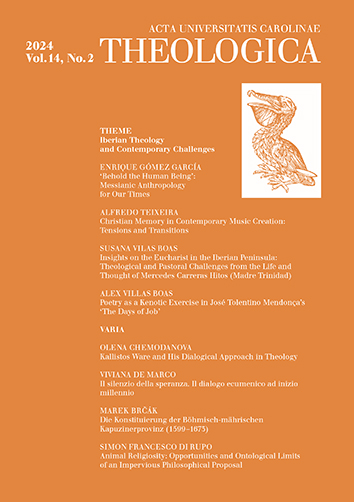AUC Theologica is a peer-reviewed journal for theology published twice a year. As we publish original papers in English, German, French, and Italian, our mission is to serve as a platform both for Czech researchers, who can present their research results in these languages, and for international contributors, who are invited to enter the academic theological discussion in the heart of Europe.
The journal focuses on a wide range of theological disciplines, such as systematic theology, biblical studies, patristic studies, pastoral and spiritual theology, religious education, church history, etc. Within these fields, the journal seeks to reflect the current theological questions and problems, which often requires interdisciplinary approaches. Supporting the intersection of various theological disciplines, we thus also welcome theological papers touching other academic fields including philosophy, sociology, literary studies, and science.
Each issue consists of two sections. The thematic section presents papers of the same focus. The section called ‘Varia’ invites papers dealing with various theological themes from the perspective of all Christian traditions. Our current and past issues are approachable for free on this website in the form of Open Access.
AUC THEOLOGICA, Vol 8 No 2 (2018), 91–109
The Influence of Philo’s De Abrahamo on Gregory of Nyssa’s De Vita Moysis
[The Influence of Philo’s De Abrahamo on Gregory of Nyssa’s De Vita Moysis]
Markéta Bendová
DOI: https://doi.org/10.14712/23363398.2018.52
published online: 08. 03. 2019
abstract
Although Gregory of Nyssa was familiar with the work of Philo of Alexandria and no doubt drew inspiration from him in many ways, the number of Philo’s works Gregory actually knew is still not known. This article explores the possible influence of Philo’s De Abrahamo on Gregory’s later work De vita Moysis, an association that has yet to be examined in sufficient detail. The similarities between both works will be elucidated by means of three themes: first, the manner in which both writings combine the retelling and allegorical interpretation of a biblical text; second, the soul’s insatiable pursuit of the good, by which the soul, in repeatedly reaching its limits, attains a kind of relative perfection, changing as a result; and third, the idea that the best inducement toward leading a good life is based on a desire for friendship with God.
keywords: Philo of Alexandria; Gregory of Nyssa; De Abrahamo; De Vita Moysis; Perfection; Virtue

The Influence of Philo’s De Abrahamo on Gregory of Nyssa’s De Vita Moysis is licensed under a Creative Commons Attribution 4.0 International License.
148 x 210 mm
periodicity: 2 x per year
print price: 100 czk
ISSN: 1804-5588
E-ISSN: 2336-3398
